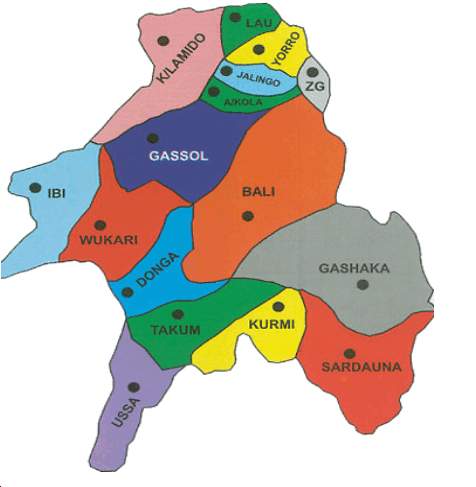Dry season farming commences in Taraba, as farmers hope to harvest twice
Farmers have commenced dry season farming across Taraba State with the hope of regaining what they lost in the flood by harvesting their crops twice this year. Land preparation and planting of rice and other crops has started since last month, our findings revealed. Some of the crops planted include beans which is a new […]

Farmers have commenced dry season farming across Taraba State with the hope of regaining what they lost in the flood by harvesting their crops twice this year.
Land preparation and planting of rice and other crops has started since last month, our findings revealed.
Some of the crops planted include beans which is a new innovation in dry season farming in the state, other crops are rice, maize and wheat.
Findings by Daily Trust on Sunday revealed that owners of farms located on both sides of River Benue in the state have fully embarked on dry season farming and hoping to witness bumper harvest.
Why wheat farming in Bauchi may suffer this year
Tomato farmers panic over FG’s paste importation approval
The areas include Sheka, Gassol, Karim-Lamido and Ardo-Kola, among others.
Some farmers who spoke with our reporter said they commenced this year’s dry season farming very early in order to harvest their crops twice this year and hopefully to regain what they lost in the flood and also repay loans they took for the last wet season farming.
A farmer, Dauda Bello, said farmers, especially those whose farms were destroyed by flood, have no choice than to embark on dry season farming early because of the devastating effect of the flood on their source of livelihood.
He said they usually commence dry season farming in December but the flood disaster has changed that, noting that the advantage of starting dry season farming very early is the possibility of harvesting twice from now till the arrival of rain in May or June next year.
According to him, those that planted rice or any other crop early could harvest their crops in February next year and replant and also harvest in May just before the start of the next wet season.
He said farmers are hopeful of regaining what they lost in the flood through this approach even though there are challenges.
Dauda said some of the challenges include high cost of diesel and petrol because dry season farmers use water pumping machine to water their farms.
He stated further that there is also the cost of rice seed, cost of weed chemicals and fertilizer which adds to the cost of production.
The chief of Mutumbiyu, Justice Sani Muhammad (retired), told our reporter that he lost three of his rice farms to the flood and that was why he commenced dry season farming very early.
He said he brought an innovation into dry season farming by planting beans apart from the rice, maize and wheat which were the usual crops in dry season farming.
The monarch, who disclosed that he started planting soon after water receeded from his rice farms, which were totally submerged by water during the flood, advised farmers to engage more on dry season farming this year because of the loses they suffered in the flood, so they’d possibly regain what they lost.
He however advised the federal and Taraba State governments to provide irrigation channels and other dry season farming facilities in areas where dry season farming is going on.
He said if such facilities are provided, as was done in Kano State and other parts of the country, more people would take to dry season farming in the state.
He also advised his subjects to stay away from farming in areas close to the river to avoid reoccurrence of this year’s disaster.
Another farmer, Engineer Yahaya Mafindi, told our reporter that he and many other farmers took loans from individuals and banks for the wet season farming but the flood destroyed their farms.
He said dry season farming, if not because of challenges, would be the best way of making money.
In the state, farmers have the advantage of producing rice and other crops twice during the dry season.
Engineer Yahaya stated that apart from vast fertile land which stretches over 150 kilometres on both sides of the River Benue, in the state, there are other numerous rivers and streams that retain water all year round.
He said all these offer ideal situation for dry season farming twice in the year but unfortunately, farmers have not been exploiting these advantages until now. It was the flood disaster that opened the eyes of most farmers to the new reality.
Daily Trust on Sunday also gathered that despite the huge amount of money and investment lost by the farmers, no assistance was rendered to them.
The state chairman of rice farmers Association, Tanko Bobbi Andami, said farmers stand to gain a lot by producing crops such as rice and maize twice in a year.
